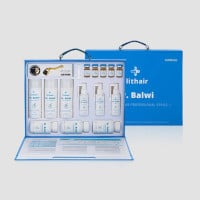
Everything You Need To Know About Drinking Alcohol After a Hair Transplant
You’ve made the decision to get a hair surgery, an investment in yourself that comes with a price tag and a promise of renewed confidence. Given the cost of a hair transplant and the effort involved, it’s only natural to want to protect that investment.
One of the most frequently asked questions during recovery is whether you can drink alcohol. It’s a fair concern. After all, even casual drinking can affect the body’s healing process. In addition, people often ask about smoking, which can negatively impact recovery and regrowth. It’s important to understand that smoking and hair loss could be linked since nicotine may restrict blood flow, making it harder for your body to deliver nutrients to newly transplanted follicles.
In this article, you’ll learn how alcohol consumption can influence your recovery, what the risks are, and how to enjoy social settings without compromising your hair results. To learn further information and ask individualized questions, you should seek counsel from your doctor or a qualified provider.
Can You Drink Alcohol Before a Hair Transplant?
If you’re planning to have a procedure, surgeons typically advise avoiding alcohol for at least three to seven days before surgery. Alcohol thins the blood and can increase your risk of bleeding during surgery. It also affects your immune system and may reduce your body’s ability to recover efficiently from the trauma of the procedure.
Doctors often recommend cutting out alcohol entirely for a week beforehand, especially if you’re undergoing a follicular unit extraction (FUE) or another advanced method of hair transplant. It’s also worth noting that alcohol can interfere with medications your surgeon may prescribe pre-surgery, such as antibiotics or mild sedatives, making it worth avoiding before a procedure.
Can You Drink Alcohol After a Hair Transplant?
After a transplant procedure, you’ll need to wait before picking up your favorite drink again. Alcohol can affect your healing by dehydrating your body and dilating your blood vessels. Both can lead to complications like swelling, prolonged bleeding, or even a compromised graft.
Most hair transplant specialists recommend you abstain from alcohol for at least one week after the surgery. However, depending on how your body responds and the specific method used, your doctor might advise a longer recovery period before drinking. Some surgeons may suggest 10-14 days if large graft sessions were performed.
How To Drink Safely After a Hair Transplant
Once you’ve gotten through the first week or two and received the go-ahead from your doctor, moderation becomes the priority. If you decide to drink, be sure to do so responsibly. Limit yourself to one or two drinks, stay hydrated by alternating with water, and avoid drinks that are heavily caffeinated or high in sugar.
If you notice unusual swelling, headaches, or fatigue after drinking, it may be a sign that your body is still adjusting post-surgery. You should keep open communication with your healthcare provider, particularly if you are uncertain whether your symptoms are alcohol-related.
How Does Alcohol Affect Hair Health and Growth?

Even if you’re months out from surgery, it’s worth understanding how alcohol impacts hair health long-term. Alcohol can drain your body of essential nutrient stores such as zinc, iron, and B vitamins, all necessary for healthy hair growth. It also contributes to dehydration and liver stress, both of which may indirectly affect your scalp and follicles.
Emerging research also links liver issues to hair loss. A stressed or poorly functioning liver may disrupt hormonal balance and nutrient absorption. These are two major players in hair health. If you’re drinking regularly or heavily, you may be inadvertently working against your goals for thicker, healthier hair.
Risks
Drinking too soon after a hair transplant can lead to several complications. Namely, alcohol slows the body’s healing response, making it more susceptible to bacterial infection. Once an infection sets in, it can be difficult to control, especially on the scalp, where moisture and bacteria can linger.
Scalp infections are a serious concern. Not only can they delay your recovery, but they can also destroy newly implanted follicles, leading to scarring or graft failure. Prompt medical attention and proper post-op hygiene are critical to preventing complications.
Besides the internal effects, drinking can also impair judgment and behavior. This increases the chances of making poor decisions during recovery, such as forgetting to follow cleaning routines or touching your scalp, both of which can introduce bacteria or accidentally dislodge newly implanted grafts.
Alternatives
If you’re used to having a drink in social settings, you can still enjoy these moments without putting your results at risk. Consider drinking non-alcoholic alternatives like sparkling water with lime, herbal mocktails, or even alcohol-free beer or wine.
There is something to be said for the opportunity to reset your habits, too. Many people use the recovery period as a time to cut back on both alcohol and unhealthy lifestyle choices. By shifting your focus to healing, hydration, and nutrition, you’re setting yourself up for a stronger outcome.
When To Talk to Your Doctor?
If you’re unsure about when it’s safe to resume drinking, or if you’ve already had a drink and are experiencing unusual symptoms, reach out to your doctor. You should also speak with them if you experience any of the following:
- Increased scalp swelling;
- Unexpected bleeding;
- Signs of infection (redness, heat, pus);
- Throbbing headaches or fatigue;
- Delayed healing or tenderness weeks after surgery.
A good doctor will understand your lifestyle and recovery goals and help you strike a balance between caution and comfort.
Hair transplants are a personal journey, and recovery looks different for everyone. But one thing remains consistent: the better your aftercare after a hair transplant, the better your results. When proper care is followed, before and after results often show a remarkable transformation in hair density and appearance. Being mindful about alcohol is a simple yet impactful way to ensure that your new follicles are getting the best possible start.


